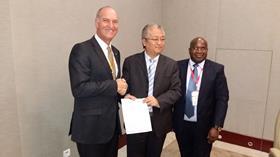
South African table grape producers and exporters says they have achieved one of the biggest breakthroughs since deregulation in agriculture, with new protocol arrangements agreed with China which could boost turnover for the country's table grape industry to more than R2.5bn within five years.
The new protocol arrangements have been confirmed by the South African Table Grape Industry (SATI) and the Department of Agriculture, Forestry and Fisheries (DAFF).
SATI said in a statement that it was delighted that China changed the cold treatment protocol for South African table grapes to a more fruit-friendly protocol. “This creates a market opportunity to increase table grape exports from South Africa to China to about R2.5bn over the next five years,' it confirmed.
DAFF has confirmed that the new Chinese cold treatment protocol will be implemented immediately and will apply during the 2016/2017 season, which is due to start soon. The new protocol has changed to +0.8oC for a minimum of 20 days, from the previous protocol of -0.6oC for 22 days.
Although this exciting market for South African table grapes has been open for some time, the previous protocol meant unaffordable risks in the form of cold related damage to grape berries and stems.
Michael Laubscher, chairman of SATI, described the opportunity as a big milestone for the organisation, initiated with commercial urgency and completed successfully. “This will make China more accessible for South African producers and make our produce more competitive,' he noted.
“SATI believes this breakthrough will enable producers and exporters to realise the enormous potential in China,' Laubscher added. 'We hereby acknowledge DAFF and all the other role players who enabled us to achieve this breakthrough.”
According to Willem Bestbier, chief executive of SATI, the breakthrough was made possible by an applied research project that the industry commissioned in January 2015, conducted by researcher, Dr Tony Ware. “Supported by these research results experts in DAFF and supported by SATI ensured the protocol was changed in record time,' Bestbier said.
An economic study on the table grape market for South African grapes in China, conducted by well-known industry personality Dr Hoppie Nel in 2014, pegged the income deficit for South Africa due to the loss of quality, market share and the price difference caused by the previous cold treatment protocol at R214m.
The Chinese market for table grapes, with imports worth nearly US$600m in 2014, is the fifth biggest market and shows the biggest growth by far at 30 per cent per-year over the past five years (2010-2014). The Chinese market is also one that pays a premium for imported grapes.
SATI says that although South Africa was the fourth biggest exporter of table grapes to China in 2014 with 10,000 tons (2015, 10,600 tons), the previous protocol prevented any significant increase.
Peru and Chile exported a combined 150,000 tonnes to China in 2004, mainly due to these countries receiving lower import tariffs and less stringent cold treatment protocols than South Africa.
The new protocol and improved market opportunity presents table grape producers in South Africa with the chance to establish new vineyards to specifically serve the Chinese market, which could lead to the creation of new local job creation.






No comments yet